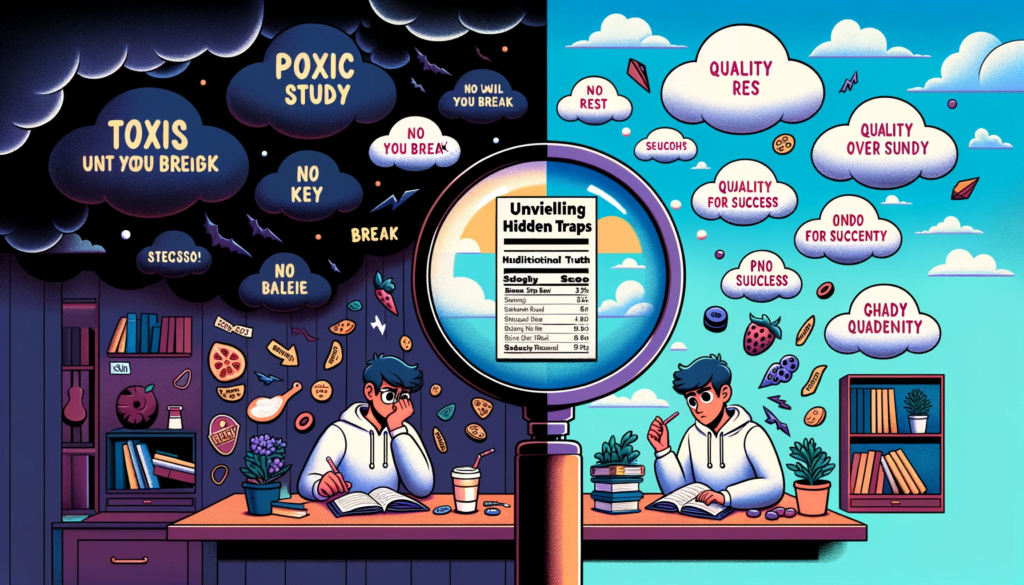Navigating Through the Maze of Toxic Study Motivation
In the sprawling universe of academia, a peculiar phenomenon often rears its head, known as “Toxic Study Motivation.” It’s a term that might seem paradoxical at first glance. After all, isn’t motivation supposed to be a positive force, propelling us towards our goals? Well, not always.
Toxic study motivation is a darker, more insidious form of encouragement that often stems from negative emotions, such as fear of failure, anxiety, or self-doubt. It’s the voice that whispers, “If you don’t study, you’ll fail, and if you fail, you’re nothing.” It’s a motivation that doesn’t come from a place of wanting to learn or improve but from a desperate need to avoid negative outcomes.
This form of motivation can manifest in various ways, such as through harsh self-talk, unhealthy study habits, or even the utilization of demotivating and negative quotes to spur oneself into action. It’s a motivation that doesn’t celebrate achievements but rather, berates any perceived lack of effort or success.
But here’s the kicker: motivation, in its true essence, should be a positive and uplifting force, guiding us towards our goals in a healthy and sustainable way. It should stem from a genuine desire to learn, grow, and achieve, not from a place of fear or self-loathing. That’s where the importance of healthy study habits comes into play.
Healthy study habits are those that encourage consistent, sustainable learning without causing burnout or stress. It’s about setting realistic goals, taking regular breaks, and understanding that it’s okay not to know everything. It’s about learning because you want to, not because you’re terrified of what will happen if you don’t.
In the forthcoming sections of this article, we will delve deeper into the abyss of toxic study motivation, exploring its various facets, impacts, and most importantly, providing you with 7 impactful insights into how you can navigate away from it and towards a healthier, more positive form of motivation.
We’ll explore real-life examples, psychological perspectives, and expert opinions to provide a comprehensive overview of this phenomenon. Moreover, we’ll delve into healthy alternatives, providing you with practical tips and strategies to transform your study habits from toxic to nourishing.
Embark on this enlightening journey with us, as we navigate through the intricate web of toxic study motivation and explore viable pathways towards adopting healthier, more constructive study habits. Your academic journey should be enriching and enjoyable, not a perpetual source of stress and anxiety. Let’s explore how we can transform these toxic practices together, fostering a healthier, more positive academic environment for all.
Understanding Toxic Study Motivation

A. Definition and Explanation: Unveiling the Mask of Toxic Motivation
Toxic Study Motivation, a term that paradoxically combines an inherently positive concept with negativity. But what exactly does it mean? In essence, toxic motivation refers to a driving force that, instead of encouraging, demoralizes and instills fear. It’s a push that comes from a place of anxiety, fear of failure, and self-doubt, rather than a genuine desire to learn and succeed. It’s the internal voice that says, “You must succeed, or else you’re worthless,” creating a study environment that’s more about avoiding failure than achieving success.
B. The Prevalence and Impact on Students: A Silent Epidemic
The prevalence of toxic study motivation among students is alarmingly widespread. It’s a silent epidemic, quietly eroding mental health and well-being. Students, under the immense pressure of grades, expectations, and future prospects, often fall into this detrimental motivational trap. The impact? Burnout, chronic stress, and a diminished love for learning. It’s a cycle where the fear of failure becomes the driving force, overshadowing the joy and curiosity that should ideally fuel the educational journey.
C. Toxic Study Motivation Quotes: A Double-Edged Sword
Quotes like, “Sleep is for the weak,” or “You can rest when you’re successful,” exemplify toxic study motivation. These phrases, often masked as motivational quotes, perpetuate a mindset where self-worth is tied to relentless work and achievement. While seemingly harmless, these quotes can subtly instill a belief that rest and self-care are signs of weakness or lack of dedication, thereby fostering an unhealthy relationship with work and study.
D. Real-life Toxic Study Motivation Examples: Stories from the Abyss
Consider Jane, a top-tier student, always acing her exams. Behind the scenes, Jane is driven by a crippling fear of failure. She pulls all-nighters, ignores her physical health, and isolates herself from friends, all in the pursuit of academic excellence. Or ponder upon John, who, despite being exhausted, pushes through his limits, fueled by quotes that equate rest with failure. These stories, while hypothetical, mirror the real-life scenarios of countless students, silently suffering under the oppressive weight of toxic study motivation.
The Psychological Perspective of Toxic Motivation

A. The Psychological Impact of Toxic Study Habits
Diving into the psychological realm, toxic study motivation often casts a shadow, silently yet profoundly impacting mental well-being. The constant pressure, the perpetual fear of not being enough, and the relentless pursuit of perfection: all these elements intertwine, forming a hazardous concoction that can significantly impair mental health. Anxiety, stress, and even depression can stem from this toxic mindset, as students find themselves shackled by their own expectations and fears. It’s a vicious cycle where the fear of failure fuels the toxic motivation, which in turn, perpetuates stress and anxiety.
B. The Role of External Pressures and Internal Struggles
External pressures, such as societal expectations, parental demands, and academic competition, often act as catalysts, igniting the flame of toxic study motivation. These pressures intertwine with internal struggles, such as self-doubt and fear of failure, creating a turbulent storm of emotional and psychological turmoil. The internal dialogue becomes one of self-criticism and negativity, where every misstep is a catastrophe and every success is merely averting failure. This internal and external tug-of-war creates a psychological battlefield, where the student is often the casualty of their own toxic motivational strategies.
C. Toxic Motivation Quotes and Their Psychological Implications
“Toxic Study Motivation” often finds its voice in quotes that seemingly inspire but subtly erode mental peace. Phrases like, “Pain is temporary, GPA is forever,” or “Sleep faster,” may seem motivating but, in reality, they perpetuate a mindset that dismisses well-being for the sake of success. These quotes, while seemingly harmless, can insidiously validate toxic study habits, making students believe that sacrificing their mental and physical health is a valid price to pay for academic achievement. The psychological implication is a belief system that equates self-worth with success and views self-care and rest as weaknesses or distractions.
Analyzing the Pop Culture and Social Media Aspect

A. The Trend of Toxic Study Motivation Wallpapers and Quotes Online
In the digital realm, a peculiar trend has surfaced, intertwining the realms of study and toxicity. Wallpapers and quotes that scream “No Pain, No Gain” or “Study Now, Sleep Later” have permeated screens and feeds, becoming a staple in the online student community. This trend of Toxic Study Motivation wallpapers and quotes, while seemingly motivational, subtly perpetuates a culture where self-worth is measured by academic success and relentless grind. The aesthetic appeal of these quotes, often juxtaposed with visually pleasing images, masks the detrimental message they convey, making them viral and impactful among the youth.
B. Social Media’s Role in Propagating Toxic Study Culture
Social media, with its vast reach and influence, plays a pivotal role in propagating a toxic study culture. Platforms are inundated with content that glorifies overworking, underlining a narrative where burnout is synonymous with dedication. The glamorization of exhaustive study sessions, sleep deprivation, and emotional turmoil as rites of passage in a student’s life perpetuates a toxic narrative. This narrative not only validates unhealthy practices but also makes them a norm, where students find themselves spiraling in a vortex of perpetual anxiety and stress, believing it to be a necessary sacrifice for success.
C. Addressing the Misconceptions and Glamorization
Addressing this issue requires debunking misconceptions and halting the glamorization of toxic study habits. It’s imperative to shift the narrative from glorifying struggle to celebrating balanced success. The notion that one must suffer to succeed needs to be dismantled, advocating for a culture that prioritizes mental health and holistic well-being alongside academic achievements. It’s about changing the dialogue from “You must suffer to succeed” to “You can succeed while also taking care of yourself.” This shift, while challenging, is crucial to foster an environment where success is not achieved at the cost of mental and physical health.
The Downside of Toxic Study Motivation

A. Impact on Mental and Physical Health
The dark side of Toxic Study Motivation casts a long, ominous shadow, particularly on the mental and physical health of students. This relentless pursuit of academic excellence, often at the expense of well-being, spirals into a vortex of stress, anxiety, and burnout. The mental toll, characterized by constant worry and fear of failure, often manifests physically, leading to sleep deprivation, weakened immunity, and chronic fatigue. It’s a silent, yet perilous journey where the mind and body bear the brunt of an unyielding, toxic motivational strategy.
B. Academic Performance and Quality of Learning
Ironically, the toxic study motivation, while aimed at boosting academic performance, often derails it. The quality of learning is compromised when the focus shifts from understanding and knowledge acquisition to mere grade attainment. Students, under the oppressive weight of toxic motivation, may resort to rote learning, neglecting the development of critical thinking and analytical skills. The pressure-cooker environment not only diminishes the joy of learning but also adversely impacts academic performance, as the learning becomes shallow, transient, and stress-induced rather than deep, meaningful, and curiosity-driven.
C. Toxic Motivation Examples in Academic Scenarios
In the academic arena, toxic motivation often plays out in various scenarios. Consider a student pulling an all-nighter, fueled by caffeine and anxiety, driven by the fear of not meeting expectations. Or ponder upon a scenario where a student, despite acing an exam, is engulfed in despair over losing a single mark. These examples underscore a pervasive issue where the fear of inadequacy overshadows achievements, and self-worth is intricately tied to academic success. It’s a scenario where the joy of learning is eclipsed by the perpetual fear of not being enough, perpetuating a toxic cycle that undermines both well-being and academic performance.
Healthy Alternatives to Toxic Study Motivation

A. Adopting a Balanced Study Routine
Embarking on a journey away from Toxic Study Motivation, adopting a balanced study routine emerges as a pivotal first step. A balanced routine intertwines dedicated study hours with essential breaks, ensuring that the mind and body are not perpetually under stress. It’s about understanding that productivity is not synonymous with constant work but is, in fact, optimized when the mind is allowed to rest and rejuvenate. Implementing techniques like the Pomodoro Technique, which intersperses focused study sessions with short breaks, can pave the way towards a balanced, healthy study routine, ensuring that learning remains a joyous, enriching journey.
B. Embracing Positive Reinforcement and Self-Compassion
Navigating away from the treacherous waters of toxic study motivation, embracing positive reinforcement and self-compassion becomes crucial. It’s about celebrating the small victories, acknowledging efforts, and understanding that setbacks are not failures but stepping stones towards growth. Self-compassion involves recognizing that you are human, and it’s okay not to be perfect. It’s about replacing self-criticism with kindness and understanding that your worth is not determined by grades or productivity. By reinforcing positive behaviors and being kind to oneself, the study journey becomes not a path of relentless struggle but a journey of continuous, compassionate growth.
C. Examples of Healthy Study Motivation Strategies
Healthy study motivation strategies are those that foster a love for learning while ensuring mental and physical well-being. One such strategy involves setting realistic, achievable goals and understanding that learning is a process, not a race. Another strategy involves creating a study environment that is conducive to focus and concentration, devoid of unnecessary distractions. Implementing mindful study sessions, where the focus is on the present task rather than worrying about the outcome, also emerges as a healthy strategy. Furthermore, integrating active learning techniques, such as teaching the learned material to someone else or applying the knowledge in practical scenarios, can make studying engaging and effective without succumbing to the toxicity of overexertion.
Expert Opinions and Solutions

A. Expert Views on Toxic and Healthy Study Motivations
In the academic realm, the dichotomy between Toxic Study Motivation and healthy study motivations has been a subject of extensive discourse among experts. Psychologists and educators often highlight the detrimental effects of toxic study habits, emphasizing the mental and physical toll it exacts on students. On the flip side, healthy study motivations are lauded for fostering a positive, sustainable, and enriching learning experience. Experts often underscore the importance of intrinsic motivation, where the drive to learn emanates from a genuine curiosity and interest, as opposed to being fueled by external pressures and fear of failure.
B. Solutions and Strategies Suggested by Psychologists and Educators
Navigating away from toxic study motivation, psychologists and educators propound several strategies. One pivotal approach involves shifting the focus from outcome to process, where the emphasis is on the journey of learning rather than the end grades. Additionally, the incorporation of mindfulness practices, stress-management techniques, and ensuring a balanced lifestyle are often recommended. Educators suggest creating a supportive, non-judgmental academic environment that encourages questions, celebrates progress, and acknowledges effort over results. The amalgamation of these strategies fosters a healthy study environment, where learning is not a source of stress but a journey of exploration and growth.
C. Case Studies of Successful Transition from Toxic to Healthy Motivation
Delving into real-world scenarios, numerous case studies elucidate the successful transition from toxic to healthy study motivation. Consider the case of a student, once shackled by the fear of failure and incessant pressure, who managed to transform their study habits through mindful practices and adopting a growth mindset. Another instance involves an educational institution that transitioned from a grade-centric approach to a learning-centric one, witnessing not only an enhancement in the students’ mental well-being but also an improvement in genuine interest and engagement in learning. These cases underscore the viability of transitioning from a toxic to a healthy study paradigm, illuminating a path that promises not only academic success but also mental and emotional well-being.
Personal Stories and Experiences

A. Sharing Stories of Students and Professionals
In the realm of academia, the narrative of “Toxic Study Motivation” has silently woven itself into the experiences of countless students and professionals alike. Sarah, a college sophomore, recalls nights drenched in anxiety, propelled by the fear of not being enough. Similarly, Dr. James, a seasoned professional, reflects on his early career, highlighting instances where toxic motivation nudged him towards burnout. Their stories, albeit different, intertwine at a common thread – the relentless pursuit of success, often at the cost of their well-being.
B. The Journey from Toxic Study Motivation to Mindful Learning
Embarking on a journey from toxic study motivation to mindful learning often involves unlearning and relearning habits. For Alex, a graduate student, the shift involved embracing failure as a stepping stone rather than a stumbling block. It meant adopting a mindset that valued progress over perfection and understanding that learning is a journey, not a race. Alex’s transition to mindful learning was not a solitary endeavor but was supported by a network of peers, mentors, and a personal commitment to change.
C. Lessons Learned and Tips from Personal Experiences
Navigating through the murky waters of toxic study motivation, individuals often unearth lessons and tips that can illuminate the path for others. One profound lesson is the realization that one’s worth is not tethered to academic or professional achievements. Tips from those who have walked this path emphasize the importance of setting realistic goals, practicing self-compassion, and seeking support when needed. These narratives underscore that while the journey away from toxic motivation is deeply personal, it is also universally relatable and achievable.
Final Thoughts

A. Summarizing Key Insights and Alternatives
In the journey through the realms of “Toxic Study Motivation,” we’ve navigated through personal stories, expert opinions, and psychological perspectives, unraveling the intricate web where motivation and toxicity entwine. The insights gleaned spotlight a pervasive issue, where the pursuit of academic and professional excellence, albeit noble, sometimes veers into a detrimental path. The alternatives presented, such as adopting a balanced study routine and embracing self-compassion, illuminate pathways towards healthier motivational strategies, safeguarding mental and physical well-being.
B. Encouraging Sustainable and Healthy Study Habits
The antidote to toxic study motivation lies in fostering sustainable and healthy study habits. It’s imperative to recognize that the pursuit of knowledge should be a nourishing journey, not a detrimental race. Encouraging a culture that prioritizes well-being, celebrates progress, and acknowledges effort over outcomes is pivotal. It’s about embracing a learning environment where failures are seen as opportunities for growth, and success is measured by the journey, not just the outcome.
C. Closing Thoughts and a Call to Action for Mindful Learning
In closing, the narratives, insights, and alternatives discussed throughout this exploration underscore a crucial call to action: to pivot towards mindful learning. It’s a collective and individual endeavor, where educators, students, and professionals alike recalibrate their perspectives on motivation and success. Let’s champion a culture that celebrates learning, prioritizes mental health, and fosters an environment where individuals are motivated by genuine curiosity and a passion for knowledge, not by fear of failure or external pressures.


